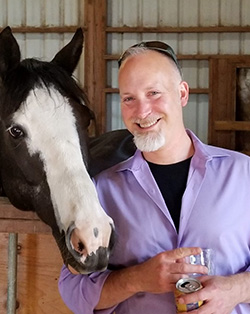
Mr. Karp and his wife have been vegan for 21 and 32 years, respectively, and care for one cat, age 14. Mr. Karp is involved with street animal rights activism, presents continuing legal education seminars on animal rights and veganism, and represents vegans in civil and criminal litigation.
He is a Martindale-Hubbell AV Preeminent-rated and AVVO 10.0 Superb-rated Superlawyer (2020-2023) who exclusively practices animal law throughout the States of Washington, Oregon, Idaho, and Hawai'i. Having graduated from Gonzaga University with a B.A. Honors (Majors in Political Science and Sociology, Minors in Spanish and Philosophy, Concentration in Women's Studies) and University of Washington with a J.D. and M.S. in statistics, this is his twenty-fifth (25th) year actively practicing law. He estimates having evaluated and/or handled over 8500 animal law cases to date and has authored Understanding Animal Law, published by Carolina Academic Press in October 2016.
Mr. Karp founded and served as first chair of the Washington State Bar Association's Animal Law Section in 2002 and has held executive committee positions since its formation. He founded the Idaho State Bar Association’s Animal Law Practice Section in 2012 and continues to serve on its executive committee. He was also a vice chair of the American Bar Association’s (“ABA”) Animal Law Committee since its creation in 2004 through 2022.
Mr. Karp served six years as a contributing editor of the Animal Legal Report, produced by Animal Legal Reports Services, regularly writes on the topic of animal law, and routinely speaks around the nation about animal law, including at Yale, Harvard, Vanderbilt, and Vermont Law School. He has taught animal law as an adjunct professor at the University of Washington School of Law, Seattle University School of Law, and a lecturer at Edmonds Community College. He has been quoted in TIME, the National Law Journal, the ABA Journal, and other periodicals, including dedicated articles on his practice in the Seattle Times, Seattle Weekly, Pacific NW Magazine, and Seattle Magazine.
The American Bar Association's Tort Trial and Insurance Practice Section's Animal Law Committee's annual Excellence in the Advancement of Animal Law Award recognizes exceptional work by an Animal Law Committee member who, through commitment and leadership, has advanced the humane treatment of animals through the law. Mr. Karp received this award in 2012. In 2019, Mr. Karp received a SEEDS Award from the International Society for Animal Rights ("ISAR").
Mr. Karp has been elected to the Fellows of the American Bar Foundation as part of the 2020 class of Fellows in Washington. The Fellows of the American Bar Foundation is a global honorary society of attorneys, judges, law faculty and legal scholars whose public and private careers have demonstrated outstanding dedication to the highest principles of the legal profession and to the welfare of their communities. Fellows are recommended by their peers and elected by the Board of the American Bar Foundation, and is limited to one percent of lawyers in each jurisdiction.
Mr. Karp co-authored the ABA Tort and Insurance Practice Section’s Survey on Animal Tort and Insurance Law for over a decade, published three articles in Thomson West’s Causes of Action series (pertaining to injuries to animals by animals, intentional injuries to animals by humans, and Section 1983 claims involving injury to an animal); two annotations in American Legal Reports (pertaining to preconviction and postconviction forfeiture of animals and private prosecution of crimes); eight articles in the legal encyclopedia American Jurisprudence Trials (pertaining to veterinary malpractice litigation, use of force against and by animals, assistance animal access, litigating actions under the Migratory Bird Treaty Act and Bald and Gold Eagle Protection Act, cadaver dog evidence, animal fighting contests, litigating the Lacey Act, improper or inaccurate food preparation by food server resulting in allergic or offended reaction); co-authored one article in the legal encyclopedia American Jurisprudence Proof of Facts related to defending dangerous dog classifications; and completed an annotation on custodial disputes pertaining to animals in American Jurisprudence Proof of Facts. Mr. Karp recently finished a treatise concerning litigation involving bans of retail pet stores and is working on another concerning litigating attorney misconduct by reference to animal imagery and other racist tropes.
He has chaired several animal law continuing legal education (“CLE”) conferences, spoken at over fifty CLEs around the nation, all on the subject of animal law, including in Hawai'i, New Mexico, Oregon, Idaho, Washington, California, Georgia, Louisiana, Michigan, Connecticut, Massachusetts, and Florida. Mr. Karp also founded and chaired the first and second Animal Law Summit, an international, cross-jurisdictional, multi-day CLE.
With positive results, he argued before the federal district courts of Washington and Idaho, the Washington Court of Appeals, Ninth Circuit Bankruptcy Appellate Panel, and the Ninth Circuit Court of Appeals on the subject of animal law, resulting in some decisions that many regard as seminal: Womack v. von Rardon, 133 Wash.App. 254 (III, 2006); Mansour v. King Cy., 131 Wash.App. 255 (I, 2006); Sherman v. Kissinger, 146 Wash.App. 855 (I, 2008); Clarke v. Tri-Cities Animal Care & Control Shelter, 144 Wash.App. 185 (III, 2008); In re Lababit, 2009 WL 7751426 (9th Cir.BAP(Wash.)2009); Downey v. Pierce Cy., 165 Wash.App. 152 (II, 2011); In re Rodrigues-Lababit, 415 Fed.Appx. 839 (9th Cir.2011); Twitchell v. Kerrigan,175 Wash.App. 454 (I, 2013); Criscuolo v. Grant Cy., 540 Fed.Appx. 562 (9th Cir.(Wash.)2013); Criscuolo v. Grant Cy., 2014 WL 527218 (E.D.Wa.Feb. 10, 2014); and Newman v. City of Payette, 2015 WL 6159471 (D.Id.Oct. 19, 2015).
Mr. Karp serves as an advisory board member for the Center for Wildlife Ethics. He also volunteered his time to the Northwest Wildlife & Rehabilitation Center, now part of the Whatcom Humane Society. Further, he completed a life-changing 10-day and, later, 3-day, course at the Vipassana Northwest Center and meditates daily.

